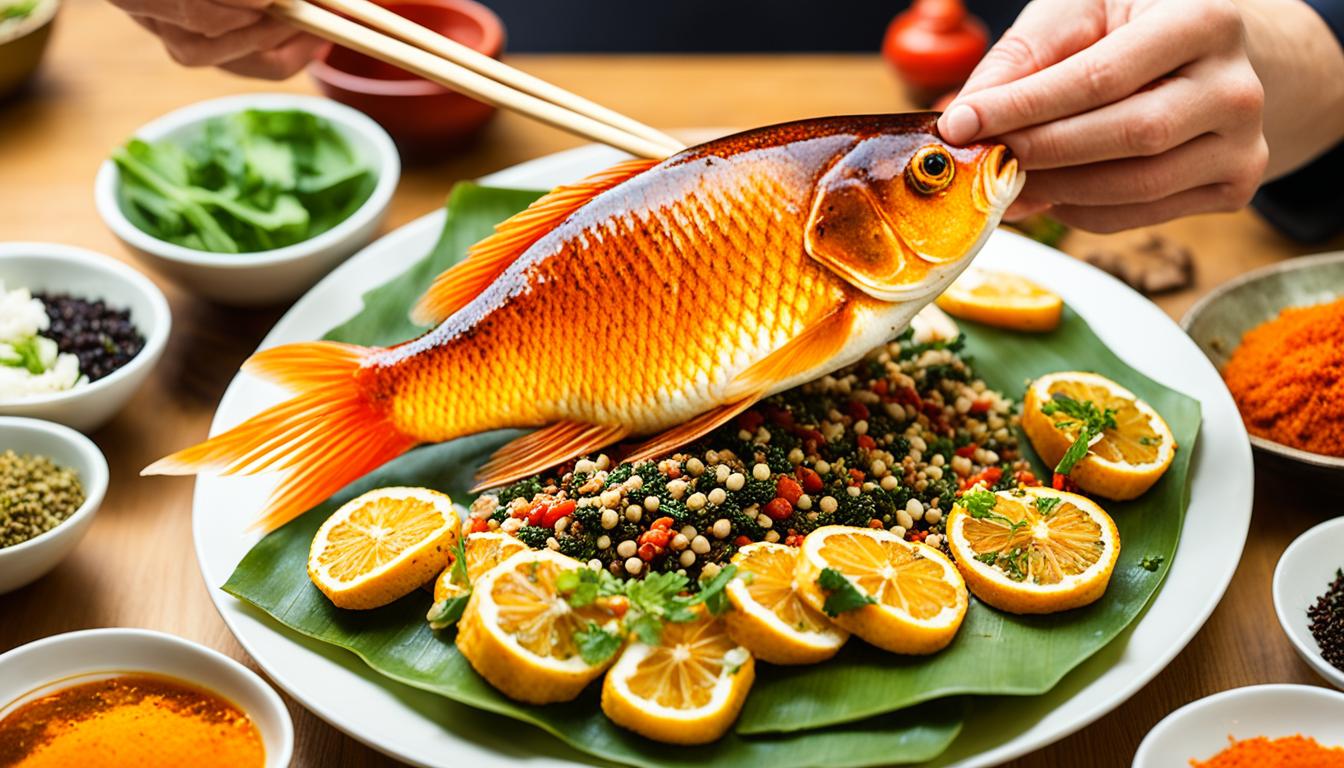Last Updated on 2 weeks by admin
Goldfish are adored by many as beautiful and fascinating pets, but have you ever wondered if they can actually be eaten? In this article, we will explore the question of whether or not large goldfish can be consumed, providing you with factual information to shed light on this intriguing topic.
Key Takeaways:
- Eating large goldfish is not recommended for human consumption.
- Feeding goldfish inappropriate foods, such as cheese, can have negative effects on their health.
- Goldfish have specific nutritional requirements that should be met to ensure their well-being.
- There are suitable food alternatives for goldfish, including commercially-made fish food and nutritious vegetables.
- Providing goldfish with a balanced and nutritious diet is essential for their overall health and growth.
Goldfish Diet: Understanding their Nutritional Needs
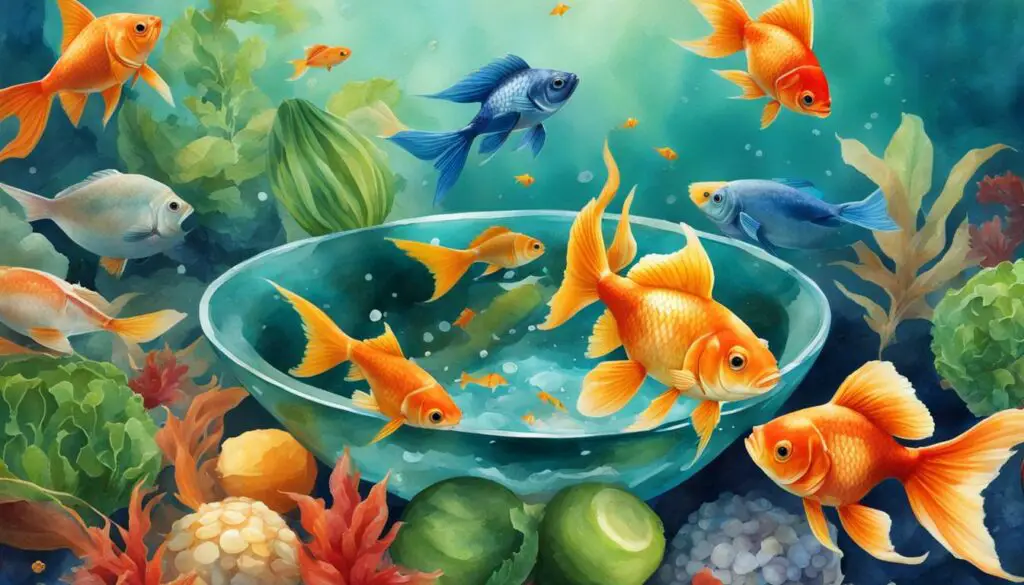
Proper nutrition is essential for the health and well-being of goldfish. As pet owners, it is our responsibility to ensure that our goldfish receive a balanced diet that meets their nutritional requirements. Understanding the dietary needs of goldfish can help us provide them with the care they deserve.
Goldfish are omnivorous creatures, meaning they can eat both plant-based and animal-based foods. Their natural diet consists of aquatic plants, insects, crustaceans, and small invertebrates.
When selecting food for your goldfish, it is crucial to consider its nutritional value. Goldfish require a diet that is rich in protein, vitamins, minerals, and fiber to support their growth and overall health. Providing them with a varied diet ensures they receive all the essential nutrients they need.
Here are some key factors to consider when it comes to the nutritional needs of goldfish:
- Protein: Goldfish need a protein-rich diet to support their growth and development. High-quality fish food and live or frozen foods like daphnia or brine shrimp are excellent sources of protein for goldfish.
- Vitamins and Minerals: Goldfish require a variety of vitamins and minerals to maintain optimal health. Fresh vegetables such as peas, lettuce, and spinach provide essential nutrients like vitamin C and fiber.
- Carbohydrates: While goldfish do not have high carbohydrate requirements, they can derive energy from plant-based foods like spirulina or wheat germ-based flakes.
It is important to note that overfeeding goldfish can lead to health problems, such as swim bladder issues or obesity. Moderation is key when feeding your goldfish.
Below is a table outlining the nutritional value of common foods for goldfish:
| Food | Protein Content | Vitamin Content | Mineral Content |
|---|---|---|---|
| Commercial Fish Food | Varies depending on the brand | Varies depending on the brand | Varies depending on the brand |
| Fresh Vegetables | Low to moderate | Varies (rich in vitamin C) | Varies (rich in minerals) |
| Daphnia | High | Rich in vitamins A and D | Rich in minerals |
| Bloodworms | High | Rich in vitamins B12 and E | Moderate |
Providing your goldfish with a variety of foods from this table can help ensure they receive a well-rounded and nutritious diet.
By understanding the nutritional needs of goldfish and offering them a balanced diet, we can help them thrive and live a long and healthy life.
Risks of Feeding Goldfish Cheese
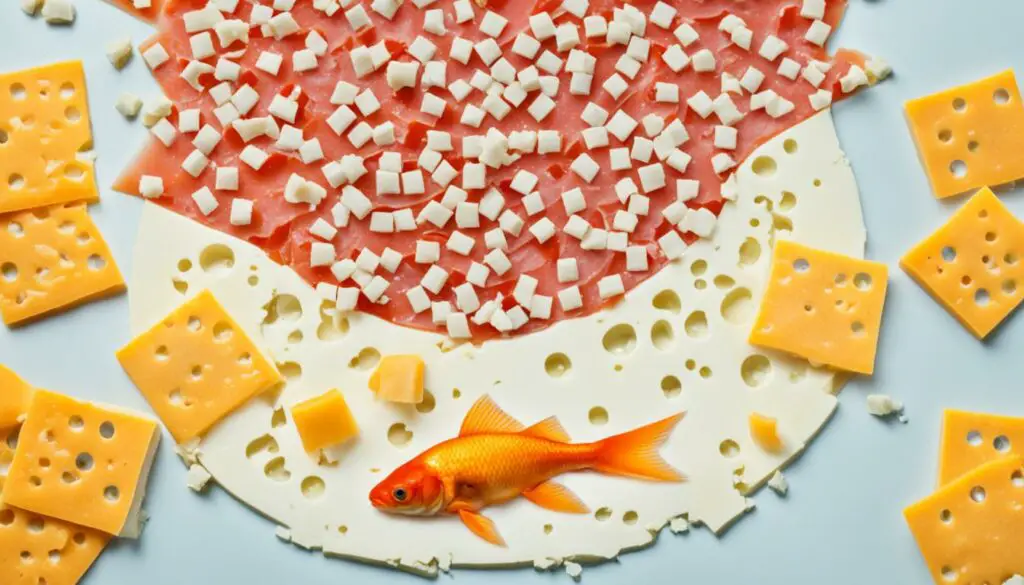
Feeding goldfish cheese may seem like a harmless treat, but it can actually pose various risks and negative effects on their health. While goldfish are omnivorous and can eat a wide range of foods, cheese is not suitable for their digestive system and nutritional needs.
Goldfish have a delicate digestive system that is adapted to process a specific diet. Their digestive system is designed to efficiently break down and absorb nutrients from plant matter, insects, and small aquatic organisms. Cheese, on the other hand, is a dairy product that contains high levels of fat, salt, and lactose.
The consumption of cheese can lead to digestive issues in goldfish, including bloating, constipation, and diarrhea. These digestive problems can cause discomfort and may even result in long-term health complications. Additionally, the high levels of fat and salt in cheese can put stress on their kidneys and liver, potentially leading to organ damage over time.
It’s important to note that goldfish have specific nutritional requirements that must be met for optimal health. Cheese does not provide the essential nutrients that goldfish need, such as proteins, vitamins, and minerals. Feeding goldfish cheese as a regular part of their diet can result in malnutrition and overall poor health.
Instead of feeding goldfish cheese, it is recommended to provide them with a well-balanced diet that meets their nutritional needs. There are plenty of suitable alternatives available that can provide the necessary nutrients for their growth and well-being.
“Feeding cheese to goldfish can have detrimental effects on their digestive system and overall health. It’s crucial to prioritize their specific dietary needs and provide them with suitable food alternatives.”
In conclusion, it is not safe to feed goldfish cheese due to the potential health risks and lack of nutritional value it offers. Understanding the specific dietary requirements of goldfish and providing them with the right foods is essential for maintaining their overall health and well-being.
Understanding the Digestive System of Goldfish
Goldfish have a unique digestive system that plays a crucial role in their overall health. By understanding how their digestive system works, we can ensure that we provide them with appropriate nutrition and maintain their well-being.
The goldfish digestive system consists of several important parts, each with its own function. Let’s take a closer look at each component:
Mouth and Esophagus
The journey of digestion begins in the mouth, where goldfish use their specialized mouthparts to break down food. The esophagus then carries the food from the mouth to the stomach.
Stomach
The stomach is where the food is further broken down and mixed with digestive enzymes. This process prepares the food for absorption in the intestines.
Intestines
The intestines are divided into two sections: the short intestine and the long intestine. The short intestine is responsible for nutrient absorption, while the long intestine aids in the processing and elimination of waste.
Pancreas and Liver
The pancreas and liver play crucial roles in the digestive process. The pancreas produces enzymes that break down proteins, fats, and carbohydrates, while the liver produces bile that aids in the digestion of fats.
Rectum and Anus
The rectum stores waste before it is eliminated through the anus. This final stage of the digestive system ensures the removal of undigested material from the goldfish’s body.
Overall, the goldfish digestive system is optimized for processing a specialized diet that includes plant matter, small invertebrates, and commercial fish food. Providing a balanced diet that meets their nutritional needs is essential for their health and longevity.
To learn more about goldfish nutrition and suitable foods for these beautiful aquatic pets, continue reading the next section: Suitable Foods for Goldfish.
Lack of Nutritional Value in Cheese for Goldfish
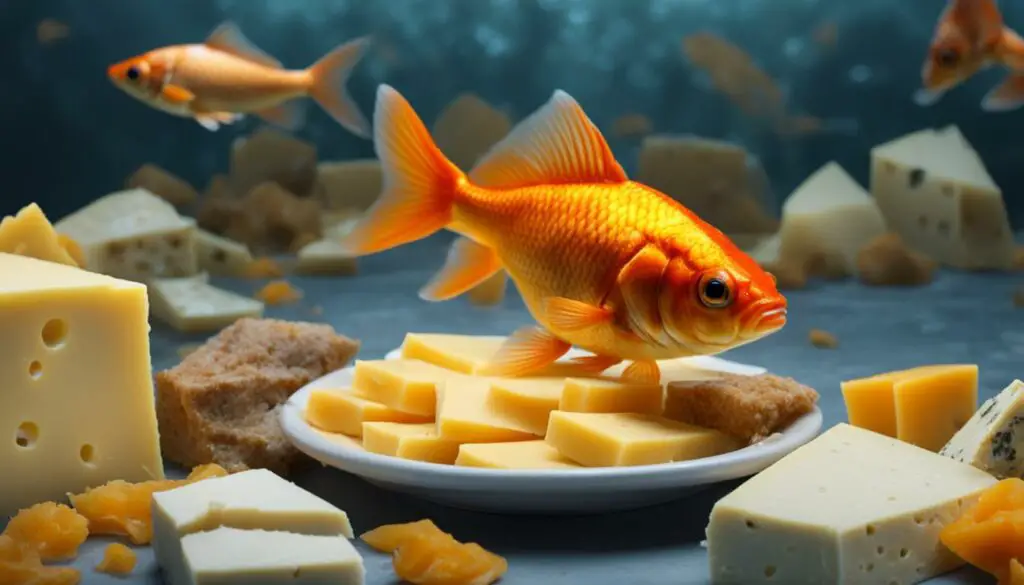
When it comes to goldfish, it’s important to provide them with a diet that meets their nutritional needs. While cheese may be a tasty treat for humans, it is not suitable for goldfish due to the lack of essential nutrients it provides.
Goldfish require a balanced and nutritionally rich diet to support their growth, development, and overall health. Cheese, on the other hand, lacks the necessary vitamins, minerals, and proteins that goldfish need to thrive.
“Cheese may be delicious, but it’s not the right food for goldfish. Goldfish need a diet that is specifically formulated to meet their nutritional requirements.”
Feeding cheese to goldfish can have negative consequences for their health. Without the necessary nutrients, goldfish may experience deficiencies that can lead to weakened immune systems, stunted growth, and increased vulnerability to diseases.
To create a clear picture of the lack of nutritional value in cheese, let’s compare it to the nutritional requirements of goldfish:
| Nutrient | Goldfish Nutritional Requirement | Cheese |
|---|---|---|
| Protein | High protein content is essential for growth and tissue repair. | Low in protein content, inadequate for goldfish needs. |
| Vitamins | Goldfish require a range of vitamins, including vitamins A, B, C, D, and E. | Vitamin content in cheese is minimal, if any. |
| Minerals | Goldfish need minerals like calcium, phosphorus, and potassium for healthy bone development and cellular functions. | Mineral content in cheese is limited and may not meet goldfish requirements. |
As you can see, cheese falls short in providing the essential nutrients that goldfish need to thrive. Feeding cheese to goldfish may not only deprive them of proper nutrition but also negatively impact their overall well-being.
It is vital to choose foods that are specifically designed for goldfish and meet their nutritional requirements. This ensures their health and helps them live long, vibrant lives.
Alternatives to Cheese for Goldfish
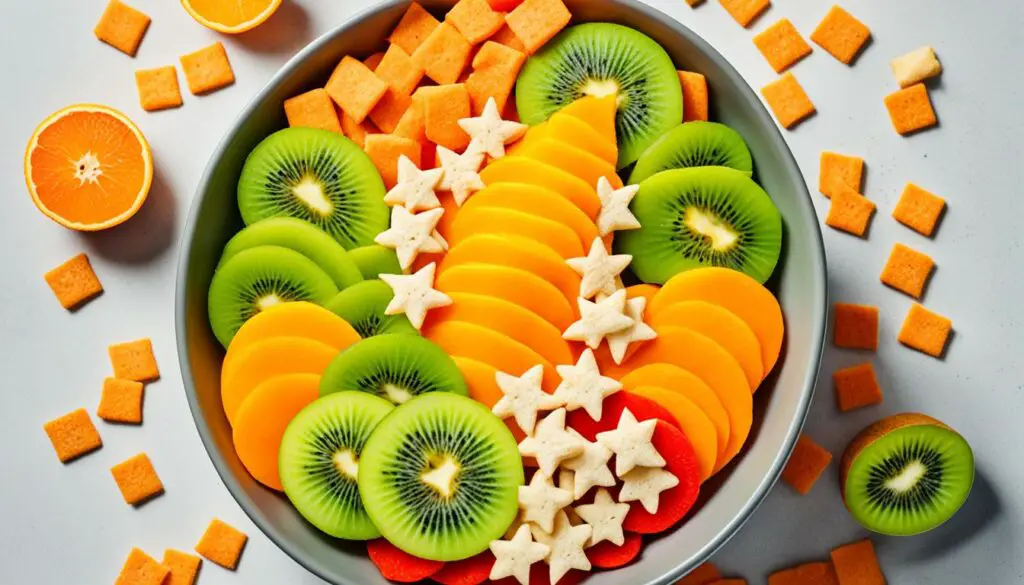
While cheese may not be a suitable food for goldfish, there are plenty of alternatives that can provide them with the necessary nutrition. Here are some food options and recipes that you can try:
1. Commercial Goldfish Food
One of the easiest and most convenient options is to feed your goldfish commercial goldfish food. These specially formulated pellets or flakes contain a balanced mix of nutrients that are essential for your goldfish’s health.
2. Fresh Vegetables
Vegetables can be a great addition to your goldfish’s diet. Try feeding them small pieces of blanched peas, lettuce, spinach, or cucumber. These vegetables are not only nutritious but also provide variety in their diet.
3. Homemade Fish Treats
You can also make homemade fish treats for your goldfish. Here’s a simple recipe to try:
Goldfish Delight:
- Ingredients:
- 1 cup oatmeal
- 1/2 cup shredded carrots
- 1/4 cup chopped green peas
- 1 tablespoon fish oil
- 1 beaten egg
- Instructions:
- Preheat the oven to 350°F (175°C).
- In a bowl, mix all the ingredients together until well combined.
- Using a teaspoon or a small cookie scoop, form small balls and place them on a greased baking sheet.
- Bake for 10-12 minutes or until the treats are golden brown.
- Allow the treats to cool before serving them to your goldfish.
These homemade fish treats are a tasty and nutritious alternative to cheese for your goldfish.
Remember to introduce any new food gradually and monitor your goldfish’s response. Every goldfish is unique, and it’s important to find the right balance and variety in their diet. By offering alternatives to cheese and providing a varied diet, you can ensure that your goldfish receives the nutrients they need for a healthy and happy life.
Suitable Foods for Goldfish
Goldfish, like all living creatures, have specific nutritional requirements that must be met in order to ensure their health and well-being. Providing a well-balanced diet is essential for their growth, coloration, and overall vitality. In this section, we will explore suitable foods for goldfish, including commercially-made fish food, vegetables, and other nutritious options.
Commercially-made fish food is readily available and formulated to meet the nutritional needs of goldfish. These products often come in the form of floating pellets or flakes, making it easy for goldfish to consume. Look for fish food specifically designed for goldfish, as it will contain the necessary vitamins, minerals, and protein to support their growth and immune system health. It is important to follow the feeding instructions provided on the packaging to avoid overfeeding, which can lead to health issues such as obesity and poor water quality.
In addition to commercially-made fish food, goldfish can also benefit from consuming vegetables. These can be blanched or finely chopped before being offered to the fish. Some suitable vegetables for goldfish include peas, spinach, lettuce, and cucumber. Vegetables provide essential fiber and help promote proper digestion in goldfish.
Goldfish have specific nutritional requirements that should be met to ensure their health.
Other nutritious options for goldfish include live or frozen foods. These can be a supplement to their regular diet and provide additional variety. Popular live or frozen foods for goldfish include bloodworms, brine shrimp, daphnia, and tubifex worms. These foods are rich in protein and can provide essential amino acids that support growth and reproductive health.
It is important to note that while goldfish can enjoy a varied diet, certain foods should be avoided. Foods that are high in salt, sugar, or spices should not be given to goldfish as they can be harmful to their health. Additionally, it is essential to avoid feeding goldfish foods that are toxic to them, such as chocolate, caffeine, and alcohol.
Table: Suitable Foods for Goldfish
| Food Type | Nutritional Benefit |
|---|---|
| Commercially-made fish food | Provides essential vitamins, minerals, and protein |
| Vegetables | Offers fiber and aids digestion |
| Live or frozen foods | Rich in protein and essential amino acids |
Goldfish require a nutritious diet to thrive. Providing them with suitable foods that meet their nutritional requirements is vital for their overall health and longevity.
Understanding the Nutritional Requirements of Goldfish
Goldfish, like any living creature, require specific nutritional needs to thrive. Meeting these requirements is essential for their health and growth. Let’s take a closer look at the essential nutrients that goldfish need to stay healthy.
1. Protein
Protein is crucial for goldfish as it plays a vital role in muscle growth, repair, and overall development. It is recommended to feed goldfish a diet that contains high-quality proteins such as fish flakes or pellets specifically formulated for goldfish.
2. Carbohydrates
Carbohydrates provide goldfish with the energy they need for their daily activities and bodily functions. While goldfish do not require a high amount of carbohydrates, including them in their diet in the form of vegetables or whole grains can provide essential nutrients and fibers.
3. Fats
Fats are a significant source of energy for goldfish, and they also aid in nutrient absorption. Including small amounts of healthy fats in their diet, such as fish oil or vegetable oil, can promote optimal health and growth.
4. Vitamins and Minerals
Vitamins and minerals are essential for the overall well-being of goldfish. These micronutrients support various bodily functions, including immune system function, bone health, and reproductive health. Including a variety of foods in their diet, such as vegetables, fruits, and commercially-made fish food, ensures a balanced intake of vitamins and minerals.
5. Fiber
Fiber plays a crucial role in maintaining goldfish’s digestive health. Including fibrous foods like lettuce or peas can help prevent digestive issues and constipation in goldfish.
6. Water
Water is vital for goldfish as it aids in digestion, waste elimination, and overall hydration. It is important to provide clean, freshwater to goldfish at all times and ensure their tank or pond is properly maintained.
Meeting the nutritional requirements of goldfish is essential for their health and well-being. Providing a balanced diet that includes proteins, carbohydrates, fats, vitamins, minerals, fiber, and ample water will help ensure that your goldfish live a happy and healthy life.
| Nutrient | Importance | Sources |
|---|---|---|
| Protein | Crucial for muscle growth and repair | High-quality fish flakes or pellets |
| Carbohydrates | Provides energy for daily activities | Vegetables, whole grains |
| Fats | Energy source and aids nutrient absorption | Fish oil, vegetable oil |
| Vitamins and Minerals | Supports various bodily functions | Vegetables, fruits, commercially-made fish food |
| Fiber | Supports digestive health | Lettuce, peas |
| Water | Vital for digestion and hydration | Clean, freshwater |
Please note: It is important to consult with a veterinarian or goldfish expert for specific dietary recommendations tailored to your goldfish’s individual needs.
Conclusion
In conclusion, it is not advisable to eat large goldfish as they are not suitable for human consumption. While goldfish are often kept as beloved pets, they are not meant to be a food source. Feeding goldfish cheese or other inappropriate foods can lead to health risks and negative consequences.
Goldfish have specific nutritional needs that must be met to ensure their well-being. These fish require a balanced and nutritious diet to thrive. While cheese may seem like a tempting option, it lacks the essential nutrients that goldfish need, leading to potential digestive issues and a lack of necessary vitamins and minerals.
Instead, it is important to provide goldfish with suitable foods that meet their nutritional requirements. Commercially-made fish food, vegetables, and other nutritious options should be prioritized to maintain the health and vitality of goldfish.
FAQ
Can goldfish be eaten?
Goldfish are not suitable for human consumption and should not be eaten. They are primarily kept as pets and have specific dietary needs that should be met for their health and well-being.
What are the nutritional requirements of goldfish?
Goldfish require a balanced diet that includes protein, carbohydrates, fats, vitamins, and minerals. Feeding them a variety of commercially-made fish food, vegetables, and other nutritious options can help meet their nutritional needs.
Are there any health risks of feeding goldfish cheese?
Yes, feeding goldfish cheese can have potential risks and negative effects. Cheese lacks the necessary nutrients that goldfish need and can cause digestive issues and harm their health.
How does the digestive system of goldfish work?
Goldfish have a unique digestive system that consists of various parts, including the mouth, esophagus, stomach, intestines, and anus. Each part has a specific function in breaking down food and absorbing nutrients.
Why is cheese not suitable for goldfish?
Cheese does not provide the necessary nutrients that goldfish require for their health and growth. Feeding cheese to goldfish can lead to nutritional deficiencies and potential consequences for their overall well-being.
What are some alternatives to cheese for feeding goldfish?
Instead of cheese, there are many suitable alternatives for feeding goldfish. These include commercially-made fish food, vegetables like peas and lettuce, and treats specifically formulated for goldfish.
What are suitable foods for goldfish?
Suitable foods for goldfish include commercially-made fish food that meets their nutritional requirements, vegetables like peas and lettuce, and other nutritious options such as brine shrimp and bloodworms.
What are the nutritional requirements of goldfish?
Goldfish have specific nutritional needs that must be met for their health and growth. They require protein, carbohydrates, fats, vitamins, and minerals in their diet to support their metabolism and overall well-being.
Source Links
- https://thegoldfishtank.com/goldfish-food/can-goldfish-eat-tropical-flakes/
- https://aquashinegoldfish.com/goldfish/can-goldfish-eat-cheese-discover-the-surprising-truth-here
- https://www.nationalgeographic.com/animals/fish/facts/goldfish

